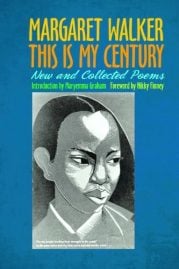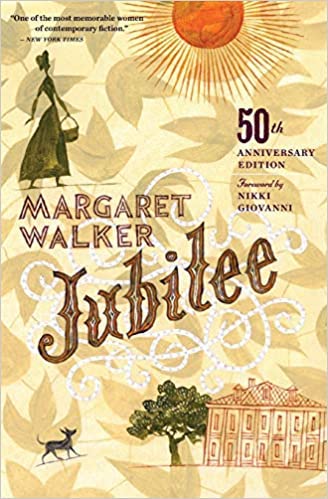11 Poems by Margaret Walker
By Taylor Jasmine | On June 11, 2020 | Updated September 2, 2022 | Comments (0)

Margaret Walker (1915 – 1998) is best known for her acclaimed novel, Jubilee (1966) as well as her richly evocative poetry. Here we’ll explore a sampling of poems by Margaret Walker, works that speak powerfully to the African-American experience.
Born in Birmingham, Alabama, Walker grew up in New Orleans and eventually settled in Chicago, where she earned a Bachelor’s degree in 1935. Growing up, she was particularly taken with the poetry of Langston Hughes.
In 1936, Walker joined the Federal Writers’ Project and the South Side Writers Group, where she became friends with fellow writer and poet, Richard Wright. In 1940, she earned a master’s degree in creative writing from the University of Iowa. She and Wright both participated in the movement called The Chicago Black Renaissance.
In 1942, Walker received the Yale Younger Poets Prize for her debut collection of poetry, For My People. She was the first African-American person to be awarded this prize. She went on to publish two more collections of poetry, and worked on her only novel, Jubilee, based on the true story of her enslaved great-grandmother.
. . . . . . . . . .

Learn more about Margaret Walker
. . . . . . . . . .
Poems in this listing include the following. You’ll find the first stanza or two, followed by a link to the full poem as well as a link to an analysis where available.
- For My People
- Sorrow Home
- Southern Song
- Dark Blood
- Love Song for Alex, 1979
- Lineage
- For Malcolm X
- Childhood
- The Struggle Staggers Us
- I Want to Write
- October Journey
Occasionally, you may see Walker referred to as “Dr. Alexander,” reflecting the doctorate degree she earned coupled with her married name. Her books were all published under the name Margaret Walker.
Walker enjoyed a distinguished career as a university professor from the 1940s through the 1970s. She received six honorary degrees and was inducted into the African American Literary Hall of Fame in October 1998.
An analysis of Margaret Walker’s body of poetic work observes that:
“Walker spoke for all African Americans, the real heroes and the legendary ones, winners and losers, men and women, adults and children.
As a poet, Walker cast herself as a prophet or an oracle, connecting with her audience not by logic but through their emotions. She often relied on the techniques used so effectively by African American preachers, including ritualistic repetition or the call-and-response format.
Sometimes she used the kind of elevated language one would expect to hear in a sermon; at other times, however, she adopted the slangy, succinct vernacular.”
In a thought-provoking analysis of Margaret Walker’s poetry, “For My People” as the Fulfillment of Margaret Walker’s Literary Manifesto, observes:
[Her] poetic act of framing Black people’s dreams into words and framing their souls into notes is an act of making them human by showing African people as critical and creative beings with desires to transcend the arresting of their natural human development and fulfill their human potential.
Margaret Walker’s published poetry collections include:
- For My People (1942)
- Prophets for a New Day (1970)
- October Journey (1973)
- This Is My Century: New and Collected Poems (1989)
. . . . . . . . . .

See also: Jubilee by Margaret Walker
. . . . . . . . . .
For My People
For my people everywhere singing their slave songs
repeatedly: their dirges and their ditties and their blues
and jubilees, praying their prayers nightly to an
unknown god, bending their knees humbly to an
unseen power;
For my people lending their strength to the years, to the
gone years and the now years and the maybe years,
washing ironing cooking scrubbing sewing mending
hoeing plowing digging planting pruning patching
dragging along never gaining never reaping never
knowing and never understanding …
(from For My People, 1942)
. . . . . . . . . .
Sorrow Home
My roots are deep in southern life; deeper than John Brown or Nat Turner or Robert Lee. I was sired
and weaned in a tropic world. The palm tree and banana leaf, mango and coconut,
breadfruit and rubber trees know me.
Warm skies and gulf blue streams are in my blood. I belong with the smell of fresh pine, with the
trail of coon, and the spring growth of wild onion …
(from For My People, 1942)
. . . . . . . . . .
Southern Song
I want my body bathed again by southern suns, my soul
reclaimed again from southern land. I want to rest
again in southern fields, in grass and hay and clover
bloom; to lay my hand again upon the clay baked by a
southern sun, to touch the rain-soaked earth and smell
the smell of soil …
(from For My People, 1942)
. . . . . . . . . .
Dark Blood
There were bizarre beginnings in old lands for the making
of me. There were sugar sands and islands of fern and
pearl, palm jungles and stretches of a never-ending sea.
There were the wooing nights of tropical lands and the cool
discretion of flowering plains between two stalwart
hills. They nurtured my coming with wanderlust. I
sucked fevers of adventure through my veins with my
mother’s milk …
(from For My People, 1942)
. . . . . . . . . .
Love Song for Alex, 1979
My monkey-wrench man is my sweet patootie;
the lover of my life, my youth and age.
My heart belongs to him and to him only;
the children of my flesh are his and bear his rage
Now grown to years advancing through the dozens
the honeyed kiss, the lips of wine and fire
fade blissfully into the distant years of yonder …
(from This is My Century: New and Collected Poems, 1989)
. . . . . . . . . .
Lineage
My grandmothers were strong.
They followed plows and bent to toil.
They moved through fields sowing seed.
They touched earth and grain grew.
They were full of sturdiness and singing.
My grandmothers were strong …
(from This is My Century: New and Collected Poems, 1989)
. . . . . . . . . .
For Malcolm X
All you violated ones with gentle hearts;
You violent dreamers whose cries shout heartbreak;
Whose voices echo clamors of our cool capers,
And whose black faces have hollowed pits for eyes.
All you gambling sons and hooked children and bowery bums
Hating white devils and black bourgeoisie,
Thumbing your noses at your burning red suns,
Gather round this coffin and mourn your dying swan …
(from This is My Century: New and Collected Poems, 1989)
. . . . . . . . . .
Childhood
When I was a child I knew red miners
dressed raggedly and wearing carbide lamps.
I saw them come down red hills to their camps
dyed with red dust from old Ishkooda mines.
Night after night I met them on the roads,
or on the streets in town I caught their glance;
the swing of dinner buckets in their hands,
and grumbling undermining all their words …
(from This is My Century: New and Collected Poems, 1989)
. . . . . . . . . .
The Struggle Staggers Us
Our birth and death are easy hours, like sleep
and food and drink. The struggle staggers us
for bread, for pride, for simple dignity.
And this is more than fighting to exist;
more than revolt and war and human odds.
There is a journey from the me to you.
There is a journey from the you to me.
A union of the two strange worlds must be.
Ours is a struggle from a too-warm bed;
too cluttered with a patience full of sleep.
Out of this blackness we must struggle forth;
from want of bread, of pride, of dignity.
Struggle between the morning and the night.
This marks our years; this settles, too, our plight.
(Originally published in Poetry Magazine, 1938)
. . . . . . . . . .
I Want to Write
I want to write
I want to write the songs of my people.
I want to hear them singing melodies in the dark.
I want to catch the last floating strains from their sob-torn
throats.
I want to frame their dreams into words; their souls into
notes …
(From October Journey, 1973)
. . . . . . . . . .
October Journey
Traveller take heed for journeys undertaken in the dark of
the year.
Go in the bright blaze of Autumn’s equinox.
Carry protection against ravages of a sun-robber, a vandal,
a thief.
Cross no bright expanse of water in the full of the
moon.
Choose no dangerous summer nights;
no heavy tempting hours of spring;
October journeys are safest, brightest, and best …
(From October Journey, 1973)
. . . . . . . . . .

. . . . . . . . . .
Leave a Reply